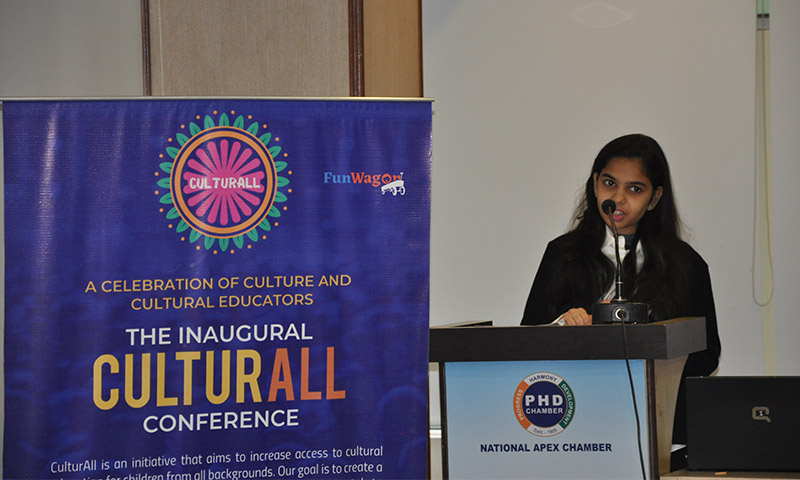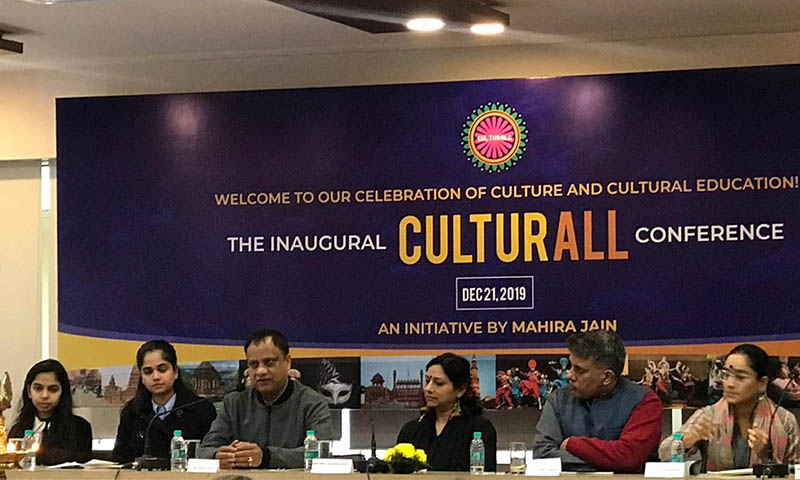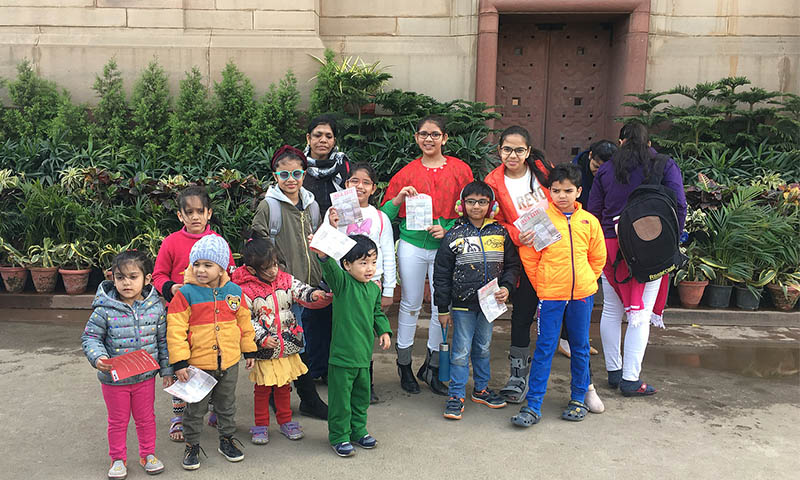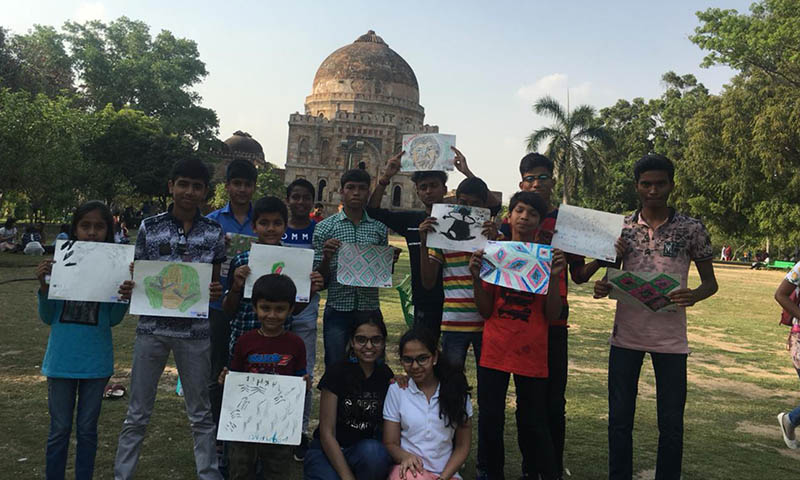Mahira Jain is a 12th-grade student at Delhi Public School, RK Puram, Delhi. Mahira is also the founder of FunWagon, a social enterprise that caters to children between the ages of 6 to 16. Besides being passionate about History, Sociology, Arts, Piano, and Indian Classical singing, she is on a mission to spread consciousness about the importance of extracurricular activities. Mahira is an active student and is a member of the Entrepreneurship Club, Sociology society, Art club, and the History Society of her school. An avid artist, Mahira, is also a spirited wildlife photographer. In a conversation with Higher Education Digest, Mahira talks about her life as a student entrepreneur, managing her studies and operations of FunWagon, her goals and many more.
What was the motive behind taking up entrepreneurship during the school days?
In grade 9, I attended a program called Young Entrepreneurs Academy, where we had to conceptualize a startup idea. I started identifying many problems such as limited options for academic and enriching recreational activities especially for children from different strata of the society, lack of focus to organize events curated for children that provide experiential learning and the lack of possibilities of secure excursions for parents to send kids for immersive learning. This inspired me to create a platform which provides well researched and age-appropriate events for students to learn outside the confines of the classroom that channelize mutual sharing and community learning and evoke interest in Indian culture, art and history from rote learning to an interactive, and customized program that engages young minds. This led me to start FunWagon.
What is entrepreneurship means to you?
Entrepreneurship, to me, means a way to express myself, my passion and provide the world with something that is not already there. It is an innovative space which helps a small idea, comparable to a seed that may have just generated from a cluster of thoughts, turn out into a tree containing ripped fruits.

Do you think, FunWagon would have been possible if the schools were not closed due to the pandemic? What is the reason behind starting FunWagon?
Due to the pandemic, we were not able to conduct in-person excursions, but the COVID-19 has actually proved to be a blessing in disguise for FunWagon. During the lockdown, I started exploring the virtual world and started virtual tours of historical sites. The virtual walkthroughs proved to be extremely beneficial for FunWagon since our reach increased and we were able to break the geographical boundaries and got the participation of children from all over India and the world including Dubai, Australia and Germany. During the lockdown, I also started a YouTube channel where I post virtual walkthroughs of historical sites of Delhi for all children to binge-watch at home and enjoy while learning about the rich culture and history at the same time.
Please tell us more about FunWagon and how it helps learners across the globe?
FunWagon is a social enterprise that caters to children between the ages of 6 to 16. Our mission is to organize exciting, interactive cultural activities, promoting experiential learning through excursions and experiences. FunWagon also communicates the importance of non-STEM subjects, by giving students a platform to emphasize and engage with different forms of the Arts, Culture, History, and more, both in-person and virtually. Up until now, we have conducted 4 excursions, including tours to the National Museum, India Gate, Gandhi Smriti and Lodhi Art District, 8 educational workshops with our NGO partners, 3 virtual tours where we got participation from students across the globe, and 5 Virtual walkthroughs on YouTube. We have partnered with 5 NGOs including Simple Education Foundation, Spread a Smile India, Sathya Sai Seva Organisation, My Perch and AAROHAN NGO, and a playschool called The Banyan. FunWagon also created an original curriculum and content (available in both English and Hindi) that helps the workshops we organize to be productive, collaborative and that bring inquisitiveness. This curriculum has now been adopted by 13 NGOs, including Ladli Foundation and Suniye NGO.

How do you manage studies and operations of FunWagon simultaneously?
Managing studies and FunWagon together is hard, but over the years, I have realized that when one is determined and hardworking, then nothing is impossible. I try to manage my time efficiently and productively, which in turn helps me manage both.
As an entrepreneur, what is it that motivates and drives you? How do you handle failures?
It is essential to choose a field or base your company on something that you enjoy doing. For me, history has always been my favourite subject and incorporating that into my startup keeps me motivated to share the same love amongst others. I do not consider my lows failures; I see them as opportunities to learn from and try a different plan to come out stronger.

In a word, describe your life as an entrepreneur.
Ecstatic
What do you put your success down to?
My first milestone was when I founded CulturALL under FunWagon. CulturALL an initiative that aims to increase access to cultural education, exposure, and opportunity for children from all backgrounds. We organized the inaugural CulturALL Cultural Education conference in December 2019 that took place in PhD chambers, New Delhi. The whole process to conduct the conference was a challenging one- meeting 20 cultural educators, convincing them to come on board for the conference and reaching out to various schools across Delhi to attend the conference and. But finally, my efforts paid off, and this was a huge success. We had participation from 5 cultural educators, including theatre practitioners, motivational speakers, dancers and the Director of CHETNA NGO and 80 audience members.
What would you say are the key elements for starting and running a successful business?
Firstly, it is super important to know your target audience. Secondly, your idea should bring something new and useful to the market and finally, your USP should be precise, distinctive and effective.

How do you generate new ideas?
I generate new ideas by understanding the gaps in the market and brainstorming about something that would genuinely be useful to my target audience.
What advice would you give to other student entrepreneurs who are starting out?
One must believe in themselves and their startup. Dedication and hard work are the most crucial for any startup to grow.
It is extremely important to be driven and motivated, especially if one’s startup isn’t doing well or isn’t going according to how one expected it to.
What do you want to do in your college and future?
I am looking to go abroad and pursue liberal arts.




